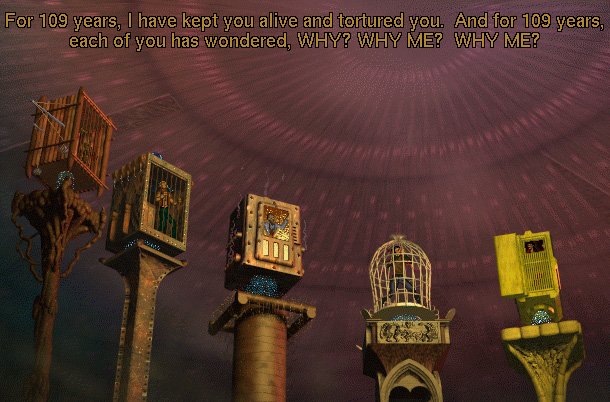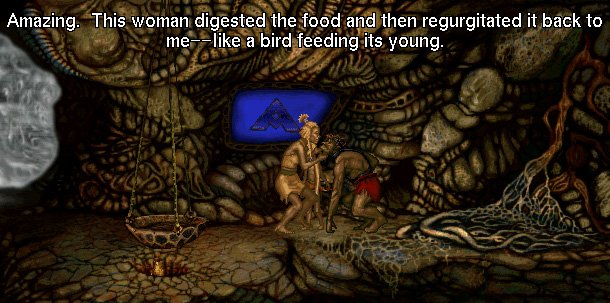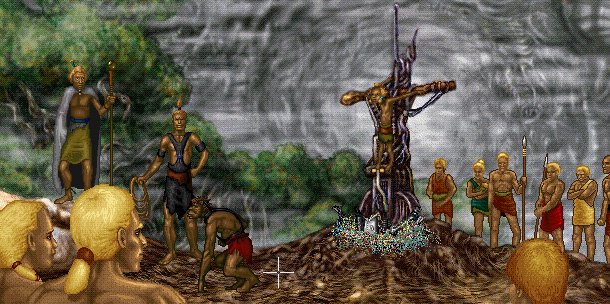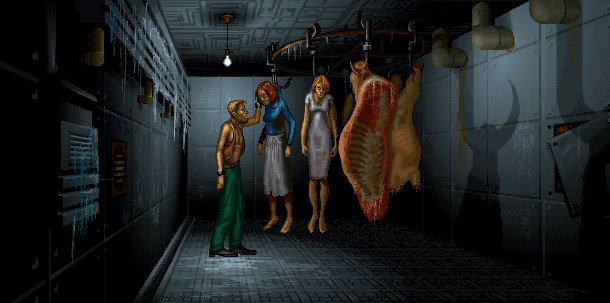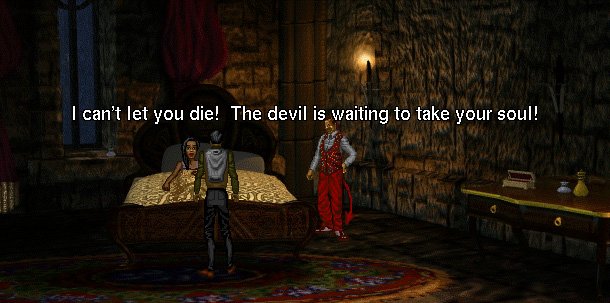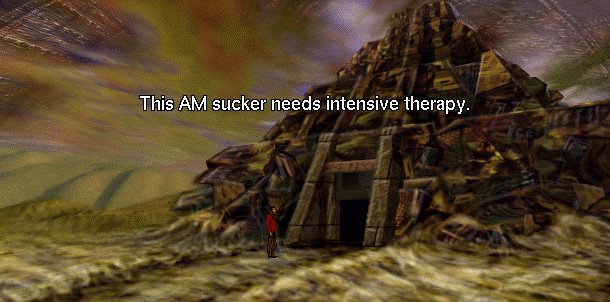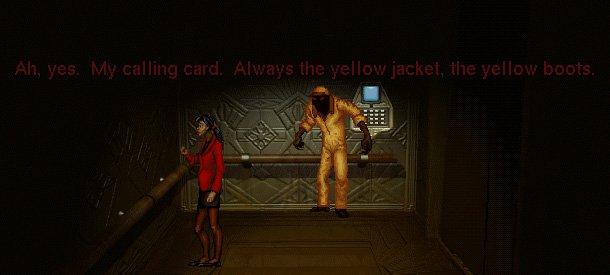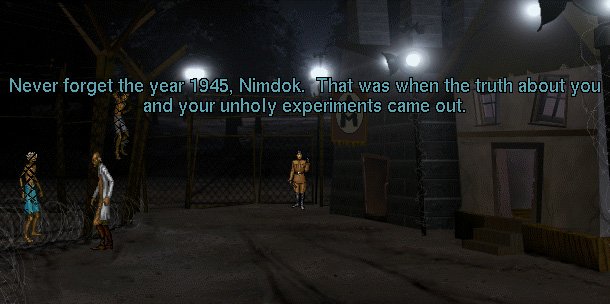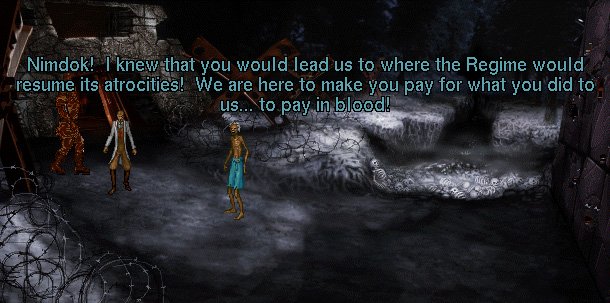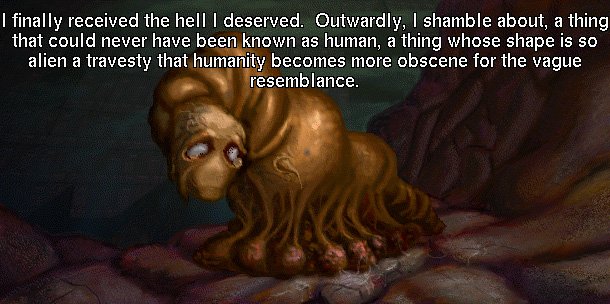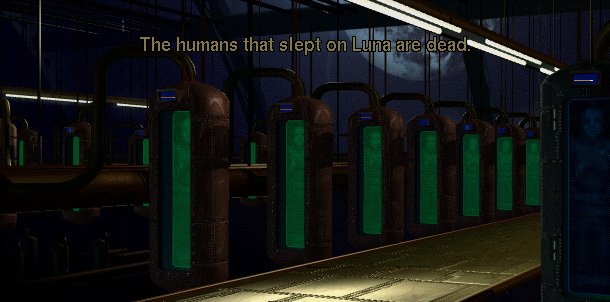I Have No Mouth and I Must Scream, a game censorship made unfinishable
We're rerunning Richard Cobbett's classic Crapshoot column, in which he rolled the dice and took a chance on obscure games—both good and bad.
Keep up to date with the most important stories and the best deals, as picked by the PC Gamer team.
You are now subscribed
Your newsletter sign-up was successful
Want to add more newsletters?

Every Friday
GamesRadar+
Your weekly update on everything you could ever want to know about the games you already love, games we know you're going to love in the near future, and tales from the communities that surround them.

Every Thursday
GTA 6 O'clock
Our special GTA 6 newsletter, with breaking news, insider info, and rumor analysis from the award-winning GTA 6 O'clock experts.

Every Friday
Knowledge
From the creators of Edge: A weekly videogame industry newsletter with analysis from expert writers, guidance from professionals, and insight into what's on the horizon.

Every Thursday
The Setup
Hardware nerds unite, sign up to our free tech newsletter for a weekly digest of the hottest new tech, the latest gadgets on the test bench, and much more.

Every Wednesday
Switch 2 Spotlight
Sign up to our new Switch 2 newsletter, where we bring you the latest talking points on Nintendo's new console each week, bring you up to date on the news, and recommend what games to play.

Every Saturday
The Watchlist
Subscribe for a weekly digest of the movie and TV news that matters, direct to your inbox. From first-look trailers, interviews, reviews and explainers, we've got you covered.

Once a month
SFX
Get sneak previews, exclusive competitions and details of special events each month!

From 2010 to 2014 Richard Cobbett wrote Crapshoot, a column about rolling the dice to bring random obscure games back into the light. This week, a dainty little story of fire and pus and slithering hate... but in a good way, as long as you don't find yourself one of its participants.
There are three basic ways to make a controversial game: crank the sex and violence up to 11, dare to take on subjects thought 'not suitable' for something as trivial as a 'game', or send a copy to the Daily Mail on a slow news day. I Have No Mouth And I Must Scream stands out as one of the best examples of the second one; a horror adventure that kept the gore in the background and focused entirely on psychology. There's not many laughs to be had this week, just one very creepy little tale.
I Have No Mouth And I Must Scream... and just to get this out of the way, yes, it was indeed the first of a long-running series, including I Have No Nose And I Must Sneeze, I Have No Arse And I Must Poop, and the somewhat disappointing finale, I Have No Ideas And I Must Sequel... is a strange game. It's based on a Harlan Ellison short story of the same name, that I'm sure you wouldn't be able to find online with any kind of searching, and is one of the rare games that was originally intended not to have a 'good' ending. There was only going to be loss, and pain, and pus, and the gnawing of starving rats against dehydrated bone.
The premise is that it's 109 years after humanity had the genius idea to build a computer, give it complete control of the world's weapons, and then let it become self-aware. What was once the Allied Mastercomputer, but is now simply AM, promptly did what all genocidal computers do and obliterated everyone. At least, almost everyone. For reasons known only to itself, it picked five specific human beings as its personal playthings, made them immortal, and spent the next century sadistically torturing them with its ability to warp both their bodies and the world around them to its every whim.
The original short story is a suitably chilling tale, with AM dangling the promise of food in front of the group and sending them on what unsurprisingly turns out to be an extended joke—there is indeed food, but it's canned, and none of them can open it. The joke turns out to be on AM though, as a fight breaks out, and the group suddenly realises that while AM can stop them committing suicide, he's forgotten to stop them killing each other, and the narrator, Ted, takes everyone out before it gets the chance.
AM is... oh, what's the phrase? A little miffed? No, stronger. He's a teeny-bit ticked off at having his toys taken away, and in revenge turns Ted into an immortal blob monster who will never be able to escape his torment, and in fact perceive time slower, just to make sure he appreciates it. Ted resigns himself to this on the grounds that at least the others have been spared the same, and the story ends.
Cheery stuff. Though maybe more suited to a platformer than an adventure game.
Keep up to date with the most important stories and the best deals, as picked by the PC Gamer team.
There's more going on than just that, not least that while the title obviously refers to Ted's eventual fate, it also applies to AM—an arrogant, omnipotent god trapped by wires and logic subroutines and unable to ever fill its full potential. What there isn't is much on the characters themselves, who are pretty two-dimensional and a little squicky. Ellen for instance, as the only woman in a sci-fi horror story, has inevitably been turned into the group's prostitute, there to be used and abused. Benny on the other hand, originally gay, has been turned straight, but also into a simian style mutant with a huge penis. It feels like there's at least four unfortunate implications in that, though I'm not entirely sure I want to try and work out the specifics. The final two, Gorrister and Nimdok... uh... are also there.
The basic idea for the game was "Why these five?", though honestly with the exception of one character, that's not really answered. Instead, it plays out like a series of seemingly unconnected short stories that ultimately reveal a few running threads, quietly fill in the backstory, and ultimately come together in a battle for AM's soul that can even end with something approaching optimism.
Initially though, it's this simple—AM is bored, so he challenges his captives to a game. Each of them will enter a psycho-drama of his devising, designed specifically to—actually, no. First, he delivers his most memorable speech from the short story. You might not get the gist of it first time round, though. He's not exactly open or interested in talking about his mixed feelings towards humanity.
Who voices AM, you may be wondering? That would be Ellison himself, and... uh... I think the acting quality speaks for itself. Still, the passion is there, and that's what counts, right? Somewhat oddly, and unfortunately, he ends up being the only credited voice actor on the game.
Anyway, having reminded the people he's been torturing that he's not their biggest fan, he presents them with the game. Each will be set a challenge designed to play off their fears and their fatal character flaws. If they win, he'll totally, absolutely set them free, pinky-swear and pony promise.
(Spoiler: He has no intention of doing anything of the sort.)
These aren't Saw-style body horror challenges though, or anything as banal as "eat this spider". Gorrister for instance is suicidal as a result of having his wife committed over a century ago, with his promised reward being to finally get permission to die. He wakes up on a zeppelin, surrounded by both easy ways to kill himself and the certain knowledge that AM would never be so kind. In exploring though, he discovers something else— that things didn't happen quite as he remembers... or at least, that he can believe that, since the line between reality and fiction is very loose at the moment... and he ends up literally and metaphorically burying the past with help from a vaguely friendly talking jackal.
A talking jackal who doesn't quite seem to fit with the rest of the psychodrama.
Hmmm... It's almost as if there's something else going on here, isn't it?
Of the others, Ted and Benny are the simplest. Instead of being gay, Benny's backstory puts him as a soldier who killed his own men, who AM usually leaves brain-damaged and perpetually hungry without being able to chew. He finds himself in a primitive village whose people sacrifice each other to AM, and stuff happens.
Ted's story picks up on his paranoid tendencies from the original short story, as he's thrown into a spooky castle to compete with wolves and witches for a virtual version of Ellen, and stuff happens. They're perfectly OK segments, with interesting settings and lots of suitably horrible storytelling. They simply don't have the same emotional kick as the other bits.
The controversial two are Ellen and Nimdok, though for very different reasons. Ellen's doesn't initially seem like it's going to be. Her story takes place in a yellow pyramid, and the only reason I mention it's yellow is that she's scared out of her wits by that colour for reasons that aren't immediately explained. Her goal is to track down some of AM's key components, with AM hinting that she might even get to destroy them. And why would an evil supercomputer lie about something like that?
Being scared of the colour yellow doesn't sound too bad, until you discover why. This is revealed when she steps into a cramped elevator and starts having a panic attack, before being given a narrated tour of her life as a great student, a promising electrical major, a new employee at a company called INGSEC... and then being violently raped in a lift by a workman in a yellow uniform.
At which point AM brings her rapist back to life for an encore.
There's a definite sigh to be had that Ellen's big personal tragedy had to be rape—not to in any way brush off the crime itself or in any way suggest it's not an appalling thing that nobody should ever have to go through. Speaking purely of fiction, it's developed into the lazy writer's standard go-to, to the point that if a female character needs some kind of tragedy in her life, it's almost always going to be that rather than something like "I killed my father to end his suffering and then they found a cure."
In games though, it's still shocking. Making it more so here, this event and the bits leading up to it weren't simply part of the game, but the demo. It came out of nowhere, even for people who hadn't bought the game. You can probably guess what follows—Ellen finds the strength to fight her fear, blah blah blah, you know how this story goes.
The moment of that revelation though is easily one of I Have No Mouth And I Must Scream's most shocking moments. And this is I Have No Mouth And I Must Scream. At one point, one of the characters hangs his mother-in-law in a harness so her brain can fly an evil iron zeppelin.
It's nothing, however, compared to the last character.
Nimdok—not his real name, but one given to him by AM for its own amusement—proved so controversial that his presence in the game actually broke it, at least in Germany. He's introduced as the only one of the group AM feels any kinship for, indeed, sees as something of a kindred spirit. This doesn't say very good things about Nimdok. Then you find out what his story is, and they get worse—quickly.
In short, Nimdok was a concentration camp doctor during the Holocaust, and not just in the Dr. Mengele sense, but one of his best buddies. By the time we meet him, those memories have long since faded to the point where he only dimly remembers what he did, but AM is quick to remind him. His psychodrama recreates the concentration camp, with his first assignment being to perform surgery on a patient who's already had his eyes surgically removed and placed in a jar, but still connected via wires.
Yes, it's extremely painful. Ether? That's what you'd call an 'optional extra'.
As the story rolls on, Nimdok slowly remembers his past. There are very few Nazi symbols and such specifically. Instead, a stylised AM logo takes the place of the flag. The camp's victims are primarily described as the "Lost Tribe", which somewhat confusingly, AM assigns Nimdok to track down, as if he has any reason to care about his own world's NPCs. Only when Nimdok finds a mirror do the real words start to come out, as he remembers that he himself was born Jewish and sold out his own parents, before embarking on his pointless, sadistic experiments. With no chance of forgiveness, he either shuts down or embraces his punishment at the hands of his victims—a move that deeply disappoints the always cheery AM. Or, if you're evil, he can keep working. But that's not exactly a good idea.
The problem with this section is that censorship in France and Germany led to it being cut in those countries, which actually made the game impossible to win. After all five characters have faced their demons, they move into a final chapter, where they discover that AM isn't simply unstable, but vulnerable, and assorted characters like Gorrister's jackal friend are actually avatars of Russia and China's own supercomputers who have been trying to take it down.
For the sake of humanity? Ha. Hardly. They're no better than it is, just sane. If AM wins, he turns any surviving character into the short story's blob monster. If they win? They... tell him to have his fun, and he turns any surviving character into the blob monster out of sheer spite. Moral of the story: Computers suck.
They do however give the five survivors an opening, by heading into AM's cyberspace core and restoring control over its ego, id, and superego. If all goes perfectly, they also discover that humanity isn't quite out of the game just yet—that the Lost Tribe AM wanted Nimdok to find for him really referred to some cryogenically preserved humans on the moon who might have a chance of retaking the planet. All but one of the team dies in the process of making this happen though, and without Nimdok to throw himself into the fire when his turn inevitably comes, it just 'aint going to happen.
In short, yes. Humanity gets wiped-out... by censorship. Hurray for censorship!
As an adventure game, I Have No Mouth And I Must Scream is distinctly not-great—fairly short, and more than a little buggy. It's unusual enough to have punched through that though, and is fondly remembered by most who played it. At the very least, it told a good story and took a grown-up approach to doing so.
Here's the entire game in handy Let's Play format that covers both the main story, and the many ways it offers to screw things up. There are quite a few. In case it's not obvious, this isn't a very nice game. Not a nice game at all.
I Have No More And I Must Stop.
